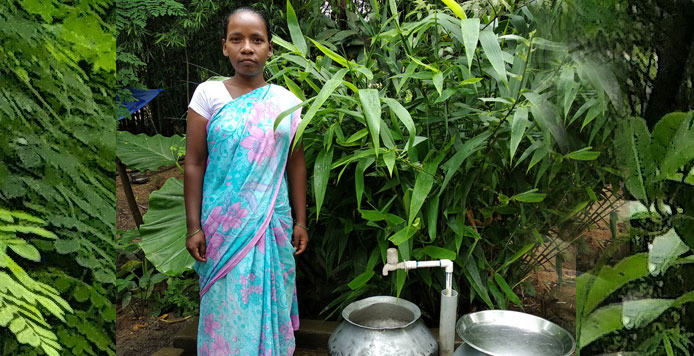
Bhursa is a village in Khunti district, Jharkhand. It is one of the villages impacted by the Tata Trusts’ Collectives for Integrated Livelihoods initiatives, in partnership with Bill and Melinda Gates Foundation. Bhursa’s population mostly consists of people from scheduled tribes, and the Trusts had initiated their ‘Lakhpati Kisan’ initiative in 2015; by 2018, Bhursa had the credit of becoming a ‘Lakhpati village’ with 26 households on the ‘Lakhpati’ list.
Fulmani Nag and her husband James Nag are one of these ‘lakhpatis’, having involved themselves in many different livelihood activities such as high value agriculture with improved paddy cultivation, pig rearing and backyard poultry. All these have increased their household income to Rs1.5 lakh from a baseline Rs30K.
“I was motivated by my mother-in-law, Mrs Poulina Nag,” says a beaming Fulmani. Poulina, who was actively involved in the Trusts’ programme, helped Fulmani to increase their high-value agriculture acreage and to diversify into other livelihood activities that raised their family income.
Fulmani took advantage of the Trusts’ Community Drinking Water Supply Scheme under its Tata Water Mission, which provided piped water connection to 31 out of the 62 households in the village in its first phase. Joining the execution committee of this scheme, Fulmani purchased a water filter through the Murhu Nari Shakti Kisan PC, an apex community institution, to ensure safe drinking water for her household. With financial assistance from the Swachh Bharat Mission incentives, and the technical guidance of the CInI’s implementation agency, NBJK, Fulmani also constructed a toilet for their household use. She’s only one among the many residents of Bhursa who have benefited from these schemes.
Breaking taboos, creating awareness
Along with livelihood challenges, the women in Bhursa also suffered from severe health issues related to menstruation. Due to the taboos surrounding this issue, and a lack of awareness regarding the same, women needlessly suffered from cramps, heavy bleeding, irregular periods, etc., without recourse to health facilities that are often too far away. Living in far-flung villages, they also have limited access to hygienic sanitary materials and the safe disposal of the same, which leads many to manage their periods in uncomfortable, ineffective, and unhygienic ways.
The Trusts’ Menstrual Hygiene Management awareness campaign was initiated in 2019 to address these very issues. Fulmani, who had her share of menstrual woes, was able to share them with her trainer, Mrs Chandu Nag.
As a ‘Samajhdar Didi’, Chandu was able to address Fulmani’s fears and to connect her to a gynaecologist in a nearby village block health centre. Today, Fulmani is not only aware of menstruation hygiene, but is herself a ‘Samajhdar Didi’, who motivates other women through training. As of June 2020, approximately 2,400 women and girls have been trained in modular form with four sessions for each group.
Bhursa is thus a positive affirmation of the impact of community action, spurred on and supported by the Tata Trusts.

